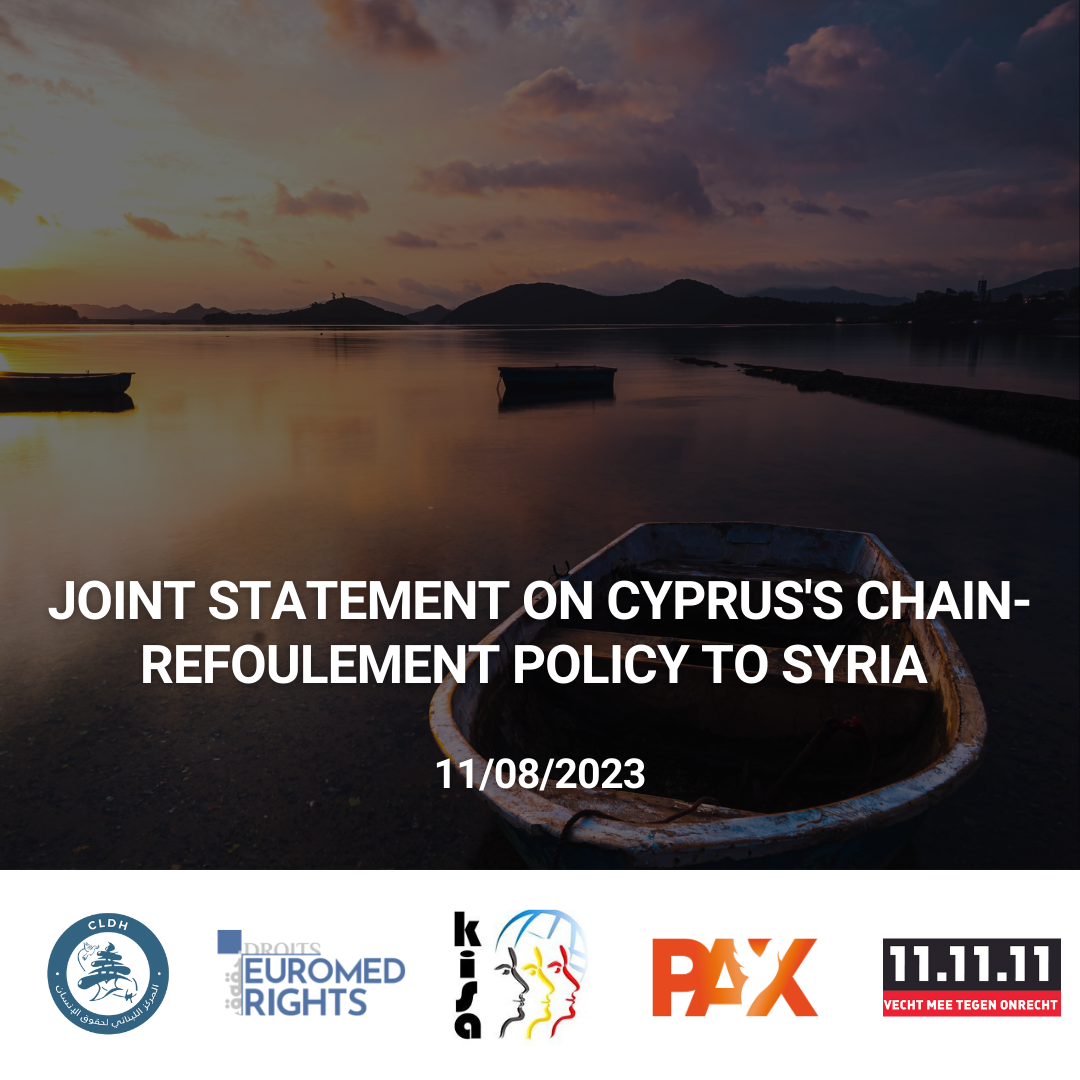Cyprus must stop its policy of pushbacks to Lebanon which results in deportations to Syria, thus violating the human rights principle of non-refoulement and exposing Syrians to inhumane treatment and torture.
We are alarmed by recent events confirming a long-term policy:
- Since the end of July 2023, at least 109 individuals were forcibly returned from Cyprus to Lebanon, and at least 73 were subsequently deported to Syria and handed over to the Syrian regime.
- In particular, on the 30th of July 2023, Cyprus forcibly returned 73 individuals to Lebanon, which subsequently deported them to Syria and handed them over to the Syrian army. This event marks a new development in the pushbacks praxis from Cyprus to Lebanon, as the people reportedly left Tartous, Syria, and did not come from Lebanon. In a previous similar event, Lebanese authorities criticized the deportation from Cyprus when they found out that the persons had actually left Syria and not Lebanon; recent diplomatic talks may have changed Lebanese position, possibly multiplying pushbacks from Cyprus to Lebanon, and thus chain-refoulement to Syria.
- On the 3rd of August 2023, 36 passengers, including one child, on two boats were forcibly pushed back from Cypriot waters to Lebanon and were then arbitrarily detained by the General Security. We fear that they have or will be deported to Syria.
These chain refoulement incidents are evolving against a changing political context. Cyprus and Lebanon recently agreed to reinforce their already existing border enforcement cooperation. During a visit to Lebanon on the 27th of July 2023, Cypriot Minister of Interior Konstantinos Ioannou agreed with Lebanese officials to step up the information exchanges and conduct joint maritime patrols to intercept individuals leaving Lebanon or Syria, and may forcibly return them to Lebanon, despite public knowledge that Lebanese authorities have previously deported similar individuals to Syria in the past, and that they are at risk of arbitrary detention, torture and forced disappearance. Cyprus also committed to advocate at the EU level for more support to border enforcement in Lebanon, despite such policy already violating human rights, and empowering forced returns to Syria.
These pushbacks by European national authorities have already been deemed illegal by courts elsewhere, especially on forced returns to Libya by Italian authorities and are likely to face the same fate in cases pending before the European Court of Human Rights. Both the forced returns to Lebanon and Syria, and the border enforcement cooperation are illegal and should be stopped, as they contravene the right to asylum, the principle of non-refoulement, the 1951 Refugee Convention, the European Convention on Human Rights (ECHR), the Convention on the Rights of the Child, Article 3 of the Convention against Torture, which forbids forced returns to a “State where there are substantial grounds for believing that he would be in danger of being subjected to Torture”, and the International Convention on Maritime Search and Rescue, which states that a rescue operation shall end with the disembarkation of survivors in a place of safety, where their primary needs and human rights are respected.
Moreover, this policy pushes people into routes with greater risks to avoid being forcibly returned. Italy has replaced Cyprus as the top destination for boats leaving Lebanese shores, despite being up to 10 times further.
The below signatories call on Cyprus to comply with its international legally binding commitments by refraining from forcibly returning individuals to Lebanon without evaluating their need for protection and the risks they face in Lebanon and Syria. Cyprus should also strictly restrict its cooperation with Lebanese authorities to the rescue of boats in immediate distress and must exclude interceptions and pullbacks. We recall that conditions in Syria remain not safe for return and that respective protection mechanisms for Syrians in Lebanon are not in place.
We call on the EU, in particular the European Commission and Frontex, to conduct in-depth investigations on the use of European funding to Cyprus to conduct interceptions and forced returns to Lebanon and Syria. Such funding would make the EU legally liable for the human rights violations committed in Cyprus, and, following refoulement, in Lebanon and Syria, as stated in Article 16 on the Responsibility of States in Internationally Wrongful Acts (ARSIWA).
We call the United Nations, in particular the UNHCR, to considerably extend their monitoring capacities in Syria, in particular to closely monitor the situation of returnees in Syria, and to make their findings publicly available in an open and transparent manner.
Lebanon must ensure the respect of the human rights of individuals rescued and forcibly returned, especially the right to have access to an effective remedy, the prohibition of arbitrary arrest and detention, and of forced return to Syria under Article 3 of the Convention Against Torture. Lebanese authorities should enable civil society organizations and lawyers to come in contact with these persons, in order to ensure the respect of their rights and the monitoring of their fate.
Signatories:
KISA – Equality, Support, Antiracism
Lebanese Center for Human Rights (CLDH)


